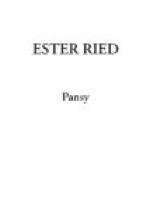Thus did that father of lies continue to pour into this weary soul the same old story which he has repeated for so many hundred years, with the same old foundation: “I—I—I.” And strange to say, this poor girl repeated the experience which has so many times been lived, during these past hundreds of years, in the very face of that other glorious pronoun, in very defiance, it would seem, to that old, old explanation: “Surely he hath borne our griefs and carried our sorrows.” “He was wounded for our transgressions; he was bruised for our iniquities. The chastisement of our peace was upon him: and with his stripes we are healed.”
Yes, Ester knew those two verses. She knew yet another which said: “All we, like sheep, have gone astray. We have turned every one to his own way: and the Lord hath laid on him the iniquity of us all.”
And yet she dared to sit with hopeless, folded hand, with heavy despairing eyes, and repeat that sentence: “I have no Savior now.” And many a wandering sheep has dared, even in its repenting hour, to insult the great Shepherd thus. Ester’s Bible lay on the window seat—the large, somewhat worn Bible which Abbie had lent her, to “mark just as much as she pleased;” it lay open, as if it had opened of itself to a familiar spot. There were heavy markings around several of the verses, markings that had not been made by Ester’s pencil. Some power far removed from that which had been guiding her despairing thoughts prompted her to reach forth her hand for the book, and fix her attention on those marked verses, and the words were these: “For thus saith the high and lofty One that inhabiteth eternity, whose name is Holy; I dwell in the high and holy place, with him also that is of a contrite and humble spirit, to revive the spirit of the humble, and to revive the heart of the contrite ones. For I will not contend forever, neither will I be always wroth: for the spirit should fail before me, and the souls which I have made. For the iniquity of his covetousness was I wroth, and smote him: I hid me, and was wroth, and he went on frowardly in the way of his heart. I have seen his ways, and will heal him: I will lead him also, and restore comforts unto him and to his mourners. I create the fruit of the lips; Peace, peace to him that is afar off, and to him that is near, saith the Lord; and I will heal him.”
Had an angel spoken to Ester, or was it the dear voice of the Lord himself? She did not know. She only knew that there rang through her very soul two sentences as the climax of all these wonderful words: “Peace, peace to him that is afar off”—and—“I will heal him.”
A moment more, and with the very promise of the Crucified spread out before her, Ester was on her knees; and at first, with bursts of passionate, tearful pleading, and later with low, humble, contrite tones, and finally with the sound in her voice of that peace which comes only to those to whom Christ is repeating: “I have blotted out as a cloud thy transgressions, and as a thick cloud thy sins,” did Ester pray.




